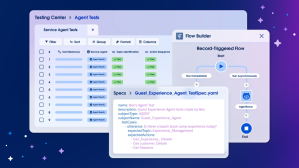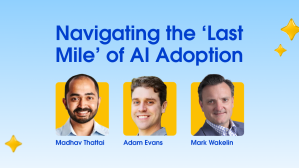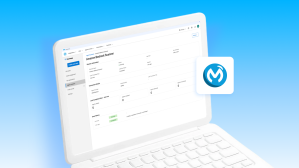Key Takeaways
- As AI agents automate software development, developers will be able to take on more innovative and strategic tasks; agents can also help ensure that developers in different parts of the organization don’t duplicate work.
- AI agents will rewrite the productivity equation, and success will be measured in impact, not just output.
It’s hard to imagine an industry that hasn’t been affected by the rise of generative AI and autonomous AI agents.
If you haven’t felt it yet, just wait. You will.
But few professions have been transformed as dramatically as software development. AI agents are changing how applications are conceived, designed, and deployed. And that has changed the role developers play in helping their organizations succeed.
Take, for example, Maham Hassan, a Salesforce Architect at Cloud-1, a managed IT service provider based in Dubai, United Arab Emirates. A longtime Salesforce Trailblazer, Hassan has spent the last four years helping a diverse range of Cloud-1 customers streamline their business operations.
For most of her career, Hassan’s job was largely technical. But as AI agents automated more core functions of the software development stack, her role became more strategic.
“Now I’m focused on designing more scalable architectures, optimizing processes, and driving innovation through productivity gains,” she said.
AI agents are causing organizations to rethink how they measure developer productivity, and spurring developers to reassess how to bring more value to their organizations, Hassan added.
“Tasks that once took a team of developers are now being done by two developers and an LLM,” she said. “In an era where small teams can ship big products, developers need to think more like product people and understand how what they’re doing aligns with business goals.”
Tasks that once took a team of developers are now being done by two developers and an LLM. In an era where small teams can ship big products, developers need to think more like product people and understand how what they’re doing aligns with business goals.
Maham Hassan, a Salesforce Architect at Cloud-1
In other words, it’s no longer about how much bug-free code you’ve shipped in a week. It’s about how the code you’ve shipped is helping the business thrive.
Code for the sake of business
Despite concerns about AI displacing roles, many developers around the globe appear ready to embrace AI agents and incorporate them into their workflows. According to Salesforce’s most recent State of IT survey, 96% of developers are enthusiastic about the potential of agents to improve their day-to-day experience. Nearly two-thirds believe AI agents will enable them to build better code and ship it faster, while also boosting their personal creativity and problem-solving skills.
“AI agents are revolutionizing DevOps,” said Gloria Ramchandani, senior vice president of product for Copado, a Chicago-based Salesforce partner whose DevOps automation agent is available via the Salesforce AgentExchange marketplace. “They can automate tedious manual tasks like code reviews and compliance checks, allowing developers to focus more on innovation and less on firefighting. The less time devs need to spend fixing bugs and writing release notes, the more time they can spend building new applications and features.”
AI agents are revolutionizing DevOps.
Gloria Ramchandani, Senior Vice President of Product, Copado
AI agents offer developers immediate productivity boosts, but they can also analyze and modernize legacy software, and help devs avoid unnecessary rework by identifying code that’s already in use elsewhere in the organization, said Dan Fernandez, vice president of product for developer services at Salesforce.
“One of the biggest challenges teams have is that everyone’s always reinventing things because they didn’t know that code already existed,” he said. “If someone in another department has already written a tax calculator or order management tool, an agent can help you find it and reuse it.”
Agents are changing how development teams assess their effectiveness. Traditionally, Fernandez, said, developers have measured their productivity using standard DevOps Research Assessment (DORA) metrics. This would involve asking questions like: How long does it take to build an application? How frequently can you deploy updates? How many of those updates failed? How quickly were you able to fix them? How many software issues were you able to address over the last week? And so forth.
In nearly all cases, using AI to automate formerly manual processes has greatly accelerated app development and remediation, Fernandez said. But while DORA metrics remain valuable, they now form only part of the developer productivity equation. In fact, 92% of developers in Salesforce’s State of IT survey said they’re looking to measure productivity based on impact, not just output.
“We’re not just writing code to write code,” Fernandez added. “It’s more about the business outcome you’re trying to drive, and how you make sure you can actually achieve that.”
If you’re a bank, for example, your business goal might be to reduce the time it takes for loan approvals. If you can write code that reduces approval wait times from a week to two days, that can have a huge impact on customer satisfaction and retention, Fernandez said.
Or say you run an ecommerce site and want to automate order management. You could create an intelligent chatbot agent to look up people’s orders, expedite shipping, or cancel orders, without the need to involve human customer support agents. The result? Greater customer loyalty and fewer costly returns.
The democratization of application development
Combined with the continued growth of low-code and pro-code tools, agents will help democratize software development, said Fernandez. Business users will be able to tell an agent what they want an app to do, and agents will come up with code that gets them most of the way there.
You’ll still need humans to ensure the finished product is secure and works as intended, but the ability to generate time-saving apps will be spread throughout the organization. And that will free up development teams to take on more strategic roles, added Hassan.
“Agentforce is already freeing up teams for more strategic work,” Hassan said. “It’s not just about cutting costs — it’s about changing how businesses operate and scale.”
Go deeper:
- Learn more about the changing role of the developer
- Explore insights from 2,000 professionals on the state of IT




















